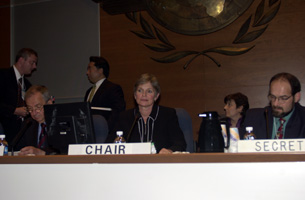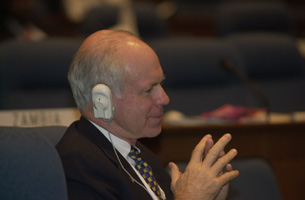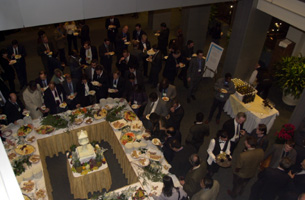|
Fourth
Meeting of the Open-ended Intergovernmental Group of Ministers or
their Representatives on International Environmental Governance
|
||
|
|
||
|
|
||
| OPENING PLENARY STATEMENTS: | ||
|
|
||
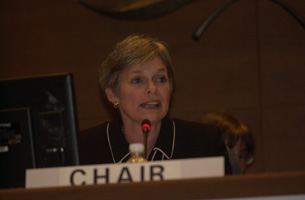 She noted the Proposals of the President of the UNEP Governing Council for consideration by IGM-4 on IEG (UNEP/IGM/4/2), highlighting additional elements on capacity development and the elaboration of linkages to sustainable development. |
||
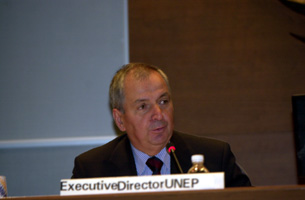 UNEP Executive Director Klaus Töpfer thanked the governments who had recently elected him to a new four-year term in office. He called on the meeting to reach a general consensus on the basic principles of IEG, as captured in the President's Proposals. He said broad agreement was sufficient to allow the GMEF to make detailed decisions in February. |
||
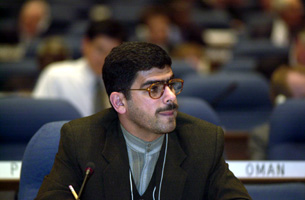 Iran, on behalf of the G-77/China, stated that there is no need for discussion on the division of work between the GMEF and the UNEP Governing Council, or GMEF membership and functions. On the relationship of the GMEF with MEAs, other organizations and the Global Environment Facility (GEF), he stated that there should be no independent role for the GMEF. |
||
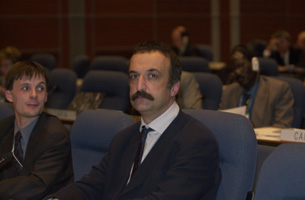 Belgium, on behalf of the EU, said part of the outcome of the WSSD should be the establishment of the GMEF as the cornerstone of a coherent system of IEG. He advocated a GMEF role in the mainstreaming of the environment into other policy fields, and suggested that the GMEF could provide guidance by identifying global environmental priorities. |
||
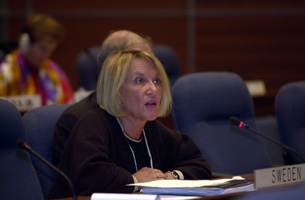 Sweden, on behalf of the Committee of Permanent Representatives to UNEP, noted the Committee's strong support for strengthening the mandate, authority and financing of UNEP. |
||
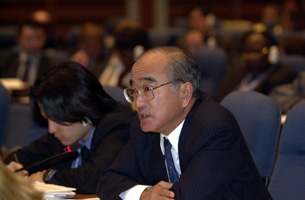 Japan cautioned against adding new layers of bureaucracy, and highlighted the need for transparency on budget matters in Nairobi. |
||
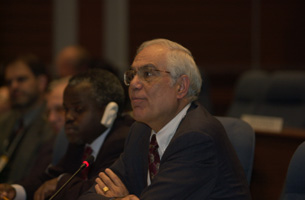 The GEF emphasized that the President's Proposals call for a strengthened relationship between UNEP and the GEF, and do not suggest that the GEF provide funding for UNEP. |
||
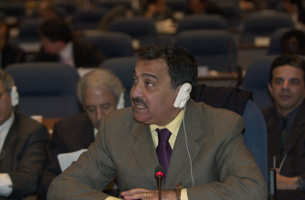 Algeria welcomed proposals from Norway for a pluri-annual work plan. |
||
|
|
||
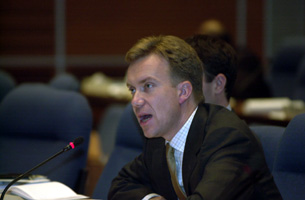 Norway
called for adequate, predicable and stable funding for UNEP as a key outcome
of the IEG process. He supported universal membership in the GMEF and
provision for civil society participation. Norway
called for adequate, predicable and stable funding for UNEP as a key outcome
of the IEG process. He supported universal membership in the GMEF and
provision for civil society participation. |
||
|
Mexico
said institutional strengthening should respect the terms of reference of
the Commission for Sustainable Development (CSD). |
||
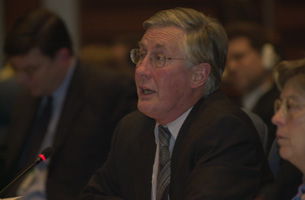 The
UK supported universal membership of the GMEF and effective participation by
NGOs and business. He endorsed a broader and more stable funding base for
UNEP using negotiated contributions based on the UN assessed scale. The
UK supported universal membership of the GMEF and effective participation by
NGOs and business. He endorsed a broader and more stable funding base for
UNEP using negotiated contributions based on the UN assessed scale. |
||
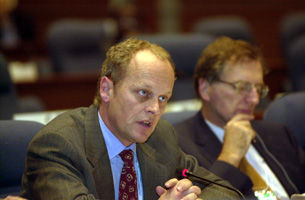 Switzerland
called for a close relationship between the GMEF and the EMG; universal
membership of the GMEF; sound and predictable UNEP funding, with fair burden
sharing; clustering along the lines set out in the IGM-4 documentation; and
capacity building to instill shared ownership of IEG at the national level. Switzerland
called for a close relationship between the GMEF and the EMG; universal
membership of the GMEF; sound and predictable UNEP funding, with fair burden
sharing; clustering along the lines set out in the IGM-4 documentation; and
capacity building to instill shared ownership of IEG at the national level. |
||
| WORKING GROUPS: | ||
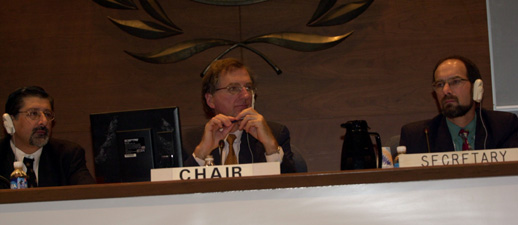 Working
Group I, chaired by Philippe Roch (left photo: center), State Secretary of
Switzerland, convened on Friday evening, 30 November and Saturday, 1
December, to consider the President's Proposals on improving coherence in
policy-making and on the role and structure of the GMEF. Working
Group I, chaired by Philippe Roch (left photo: center), State Secretary of
Switzerland, convened on Friday evening, 30 November and Saturday, 1
December, to consider the President's Proposals on improving coherence in
policy-making and on the role and structure of the GMEF.
|
||
 Kezimbira Miyingo (left), Minister of State for Environment, Uganda, chaired Working Group II, which considered the President's Proposals on improved coordination and coherence between MEAs, capacity building, technology transfer and country-level coordination for environment and sustainable development, and the role of the EMG in enhanced coordination across the UN system. |
||
|
RECEPTION HOSTED BY THE GOVERNMENT OF CANADA |
||
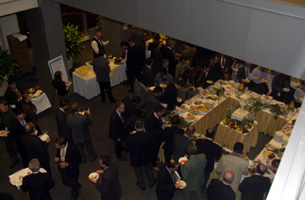
|
||
|
|
||
|
|
||
| © 2001, IISD. All rights reserved. |
|


